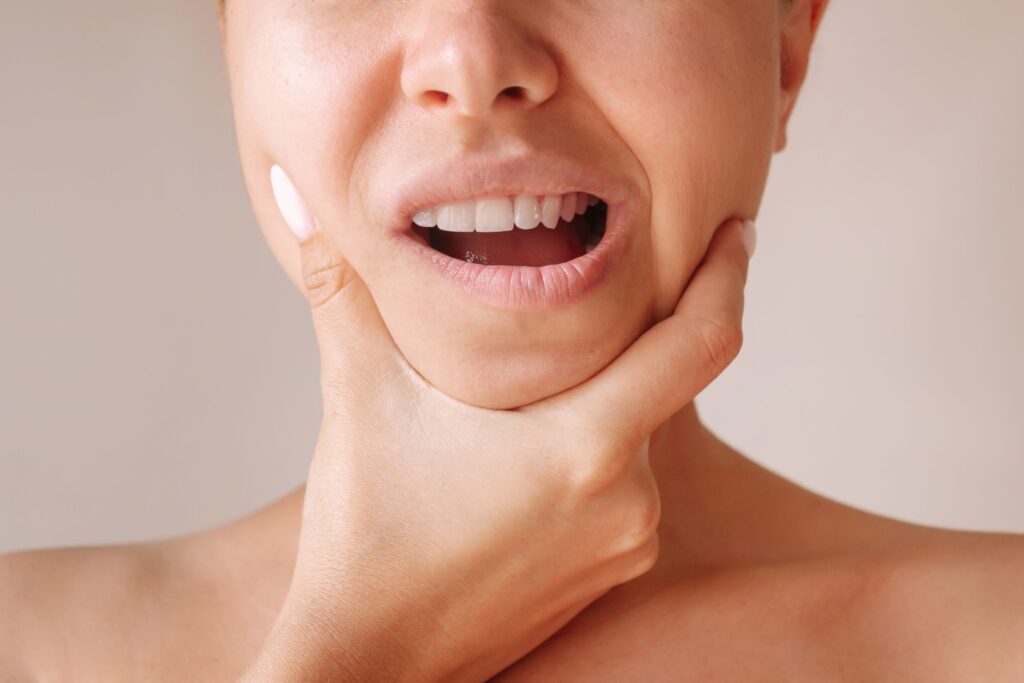
Have you noticed that your jaw feels stiff or makes clicking or popping noises when you chew? If so, there’s a chance you have developed a temporomandibular joint (TMJ) disorder. Your jawbone connects to your skull via two sliding-disc joints located just in front of your ears that are responsible for your mouth’s full range of motion. However, if these joints are overworked or become inflamed, it can cause aches and swelling that impact your well-being.
If you’re unsure who to go to for help with a potential jaw problem, continue reading to learn why you should contact your dentist first!
Why Should I See My Dentist for TMJ Concerns?
It’s natural to wonder whether you should call your primary care physician or your dentist if your jaw starts hurting, especially if you’re unsure of the culprit behind your discomfort. If it’s not an oral issue, are you wasting time by visiting your dentist near Burlington first?
The truth is that a stiff or locked jaw from TMJ often results from oral issues that are better handled by your dentist. They have unique experience and equipment to identify and address the root problem quickly.
What Causes TMJ?
If your mouth feels sore or stiff when you open it to eat or speak, it might be due to tender TMJ. There are several potential reasons you might have developed this issue, such as:
- Misaligned bite or teeth. If your upper and lower arches don’t come together correctly when you close your mouth, your jaw joints must overcompensate to function properly, which can wear them out.
- Bruxism (teeth grinding). Some people subconsciously clench their teeth together, putting unnecessary pressure on their TMJ.
- Physical trauma. If you’re an athlete or participate in team sports or activities, a blow to the face might dislodge or injure your jaw, causing problems in the joints.
There may also be other contributing factors, like arthritis, that can contribute to TMJ disorders.
How Do Dentists Address TMJ?
Once your dentist confirms that your pain is due to the joints holding your jawbones in place, they can work with you to suggest appropriate treatments based on your unique circumstances. There are several ways they can help, including:
- Providing oral appliances. They can fit you with a customized oral device like a nightguard, mouthguard, or splint, to create a layer of cushion between your upper and lower arches that allows your TMJ to relax long enough to begin recovery.
- Prescribing medications. If over-the-counter options like Tylenol or ibuprofen haven’t helped, they might prescribe a muscle relaxer to ease the aches or an antidepressant to prevent teeth grinding.
- Physical therapy. They can demonstrate various stretches and exercises you can perform daily to stretch and strengthen your jaw to increase mobility and reduce symptoms.
- Lifestyle changes. Your dentist might also discuss your daily habits and recommend changes to keep your jaw healthy, like chewing gum less frequently or grinding food with both sides of the mouth evenly.
If your dentist cannot treat the source of your jaw pain, rest assured, they will refer you to an expert who can!
About the Practice
At Complete Dental Care, you and your family benefit from two skilled dentists who share several decades of combined experience. Dr. James Kostas and Dr. Donna Pereira enjoy establishing relationships with patients to quickly identify areas of concern and provide tailored treatment plans to meet them. They offer a comprehensive menu of services conveniently under one roof and can assist with everything from basic preventive care to helping with TMJ diagnosis and treatment. If your jaw is stiff or sore and you need help, you can request an appointment on the website or by calling (781) 272-0441.







